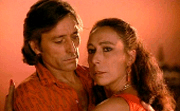While Blood Wedding, the first dance film in what would evolve to be Carlos Saura’s flamenco trilogy collaboration with choreographer Antonio Gades, distilled the art of flamenco to the essential movement of bodies and expression of the human voice, and the subsequent installment, Carmen examined the integral, often interpenetrating relationship between reality and performance (albeit, within the structure of a fictional metafilm), the final chapter of the trilogy, Love, the Magician integrates dance with the imaginative possibilities of formal construction in order to illustrate its ingraining into the performance of cultural ritual. The incongruous, oddly clinical, opening sequence establishes the seemingly isolated, self-encapsulated aesthetic that defines the film, as the camera tracks the shot of a large mechanical door that is slowly closing, before panning overhead to the curious sight of a skeletal soundstage – scaffolding, intricate networks of soaring access ladders and intersecting gantries, suspended curtains, translucent partitions, and overhead lighting – before descending to the image of a group of children playing in a rustic village. The sense of enclosure invariably proves to be a reflection of the film’s folkloric tale of unrequited love, star-crossed destiny, and mystical haunting as well. The film chronicles the intertwined fates of Carmelo (Gades), his beloved Candela (Cristina Hoyos), and her husband José (Juan Antonio Jiménez), who, as the gypsy tale begins, somberly looks on as the fathers of young Candela and José agree on their children’s arranged marriage. Years later, Candela and José fulfill their family’s pact, to the resigned melancholy of Carmelo and Lucía (Laura del Sol) a free spirit who still harbors feelings for the rakish José. Relegated to a life of deception and betrayal, the couple’s life together is soon tragically cut short when José, having gone out in the evening to meet Lucía, is stabbed to death during an altercation. Haunted by her unresolved relationship with her unfaithful husband, Candela becomes bewitched by his ghost, unable to reconcile with her grief until the ever-devoted Carmelo returns to the village to redeem his beloved from her emotional captivity in the realm of the dead. In its pervasive sense of hermeticism and formal staging, Love, the Magician may be seen as a logical precursor to The Seventh Day (a film that, perhaps not surprisingly, features flamenco songs in its soundtrack) – a cultural immersion into the profound intimacy and dysfunctionality of a close-knit community (in this case, a gypsy village) that also exposes its underlying inbred cruelty. Inevitably, it is this irrepressible sense of spiritual entrapment borne of entrenched insularity that is symbolized by Candela’s somnambulistic haunting – an unreconciled struggle to wrest free from the persistence of constructed destiny towards the instinctual trajectory of the human soul.
© Acquarello 2007. All rights reserved.
